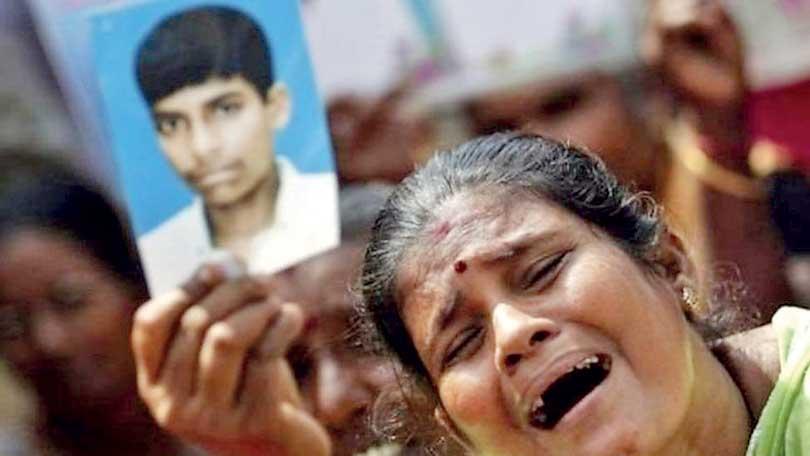Reply To:
Name - Reply Comment
Last Updated : 2024-04-25 14:06:00

 Enforced disappearances are a recognizable problem in developing countries, including those in South Asia, even though many of these countries have modern democratic institutions. State-backed abductions are tacitly accepted as a necessity on grounds of national security and political stability. Indeed, enforced disappearances are now part and parcel of the degenerate political culture of the developing world, including South Asia.
Enforced disappearances are a recognizable problem in developing countries, including those in South Asia, even though many of these countries have modern democratic institutions. State-backed abductions are tacitly accepted as a necessity on grounds of national security and political stability. Indeed, enforced disappearances are now part and parcel of the degenerate political culture of the developing world, including South Asia.
Countries in South Asia accept that enforced disappearances are a grave offence against human dignity and a violation of international law. But they do not have the political will to implement their pledges even after signing the relevant international conventions. This attitude is founded on the assumption that abductions, often followed by torture and extra-judicial execution, may be a necessary evil to retain power in a political environment which is anyway depraved. They are thought to be a necessary evil to control secession, terrorism and crimes like drug trafficking. And being imperfect democracies, human rights workers and leaders of assertive subaltern communities are also abducted and eliminated by those in power.
The International Convention for the Protection of All Persons from Enforced Disappearance (ICPPED), which was adopted at the UN General Assembly in 2006, had 57 States signing in by 2017, and according to a 2017 document of the International Commission of Jurists (ICJ) entitled: “No More Missing Persons: The Criminalization of Enforced Disappearance in South Asia,” the UN Working Group on Enforced and Involuntary Disappearances (WGEID) had received 55,273 cases from 107 countries since 1980.
Separate Offence
WGEID wants enforced disappearance to be treated as a separate and independent offence. But a number of States argue that a separate law on enforced disappearance is not needed because existing laws cover all aspects of enforced disappearance. None of the South Asian countries has drafted a specific law banning enforced disappearances. But the ICJ says that the gravity of the crime of enforced disappearance gets diluted if tackled by a plethora of laws. In any specific legislation on enforced disappearances, superiors should be held responsible for the behavior of juniors, and they cannot escape by landing the blame on superiors, the ICJ says.
No to amnesties and military tribunals
 The UN updated a set of principles for the protection and promotion of human rights through action to combat impunity, expressly prohibit the granting of amnesties and similar measures to perpetrators of serious crimes under international law which includes enforced disappearance, the ICJ says.
The UN updated a set of principles for the protection and promotion of human rights through action to combat impunity, expressly prohibit the granting of amnesties and similar measures to perpetrators of serious crimes under international law which includes enforced disappearance, the ICJ says.
“The inherent lack of independence from the executive of military tribunals make the use of tribunals unsuitable in cases against civilians or which concern violations of the human rights of civilians. Indeed, such courts have frequently acted in countries around the world to shield those responsible for human rights violations from criminal responsibility for their acts. Trials of persons accused of enforced disappearances as well as other serious violations of human rights should be excluded from the jurisdiction of military criminal courts, even where they are committed by military personnel,” the ICJ recommends.
Right to Information and Reparations
Any law on enforced disappearance should contain the right to reparations and the right to know the truth about the abductions.
“The right of victims to reparation for human rights violations is an integral part of international human rights law. The State must provide effective reparation for any violation that has been established, including through criminal proceedings. The right of family members to know the truth about persons subjected to enforced disappearance is specifically recognized by the ICPPED,” the ICJ adds.
According to Minister Mangala Samaraweera, the number of missing persons is 65,000 as filed with the various Commissions of Inquiry (CoI)since 1994. This, however, excludes the “disappearances” during the Marxist insurrection in South Sri Lanka in the early 1970s and late 1980s. But the last CoI chaired by Justice Maxwell Paranagama set the figure at over 20,000 since 1983. Of these, about 5,000 are members of the armed forces.
Sri Lanka has had eight CoI since 1991. But consecutive CoIs have failed to provide answers to the families of the “disappeared”. They were merely fact-finding initiatives with no power to prosecute. Nor were their reports binding on the President of the country who set them up. Sri Lanka has prosecuted some for enforced disappearances. In the past, there had been some convictions when the political atmosphere was liberal and the country was not so militarized in thinking. In recent times, there have been trials, but no convictions as the general political mood is against demoralizing the victorious armed forces which had annihilated the dreaded LTTE.
Sri Lanka has set up an Office on Missing Persons(OMP), but its chief, Saliya Peiris, told a weekly newspaper that government ignores its recommendations. He pointed out that the government has promoted some officers who are under investigation.
As of 2016, in India, there were 354 cases of enforced disappearances before the WGEID that remained unresolved. According to human rights groups, there have been thousands of cases in Kashmir since 1989. In India, permission from the government is necessary for prosecuting public servants and members of security forces. “Such permission is rarely, if ever, granted in cases of human rights violations. Furthermore, military courts have jurisdiction over criminal cases concerning personnel in the armed forces,” the ICJ points out.
A large number of enforced disappearances in India are reported from areas considered disturbed, like Kashmir and the States of the Indian North-East like Manipur. In response to queries the Kashmir government would say that many of the missing would have slipped into Pakistan-held Kashmir for terror training in the same way as the Rajapaksa regime in Sri Lanka had said the missing would have secretly left the country.
In Kashmir and Manipur, the Armed Forces Special Powers Act (AFSPA), which gives troops a lot of leeway, is in operation. Despite agitations for its removal, especially in Manipur, successive governments have kept it in the “national interest”.
In Pakistan, according to the NGO “Defence of Human Rights”, there were more than 5,000 cases of enforced disappearances in 2017. The “Voice of Baloch Missing Persons” alleges 18,000 people have been forcibly disappeared from Baluchistan alone since 2001. The official Commission of Inquiry on Enforced Disappearances, on the other hand, reported 1,256 cases of alleged enforced disappearance as of July 31, 2017.
The ICJ pointed out that in Nepal, which faced a protracted internal armed conflict between successive governments and the Maoistsfrom 1996 to 2006, the fate and whereabouts of more than 1000 possible victims of enforced disappearance are unknown. In Bangladesh, since the Awami League came to power with Sheikh Hasina as Prime Minister in 1996, the number of reported enforced disappearances significantly increased, the ICJ notes.
“Human rights organization Odhikar has reported over 370 cases of enforced disappearances allegedly committed by Bangladesh law enforcement agencies from 2009 to July 2017. Human Rights Watch recorded over 90 cases of enforced disappearance in 2016 alone. As of July 2017, the UN Working Group on Enforced and Involuntary Disappearances (WGEID) more than 40 outstanding cases from Bangladesh,” the ICJ reports.
Since 2009, a large majority of those subjected to enforced disappearance in Bangladesh are members of opposition political parties and other political activists, the ICJ alleges.

Add comment
Comments will be edited (grammar, spelling and slang) and authorized at the discretion of Daily Mirror online. The website also has the right not to publish selected comments.
Reply To:
Name - Reply Comment
US authorities are currently reviewing the manifest of every cargo aboard MV
On March 26, a couple arriving from Thailand was arrested with 88 live animal
According to villagers from Naula-Moragolla out of 105 families 80 can afford
Is the situation in Sri Lanka so grim that locals harbour hope that they coul